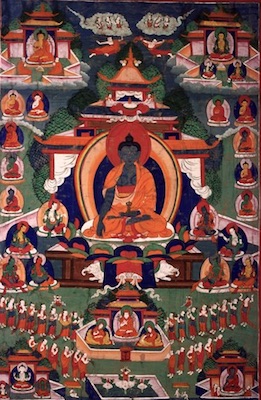Akshobhya: Difference between revisions
Jump to navigation
Jump to search
No edit summary |
m (→External Links) |
||
| Line 4: | Line 4: | ||
==External Links== | ==External Links== | ||
*{{LH|topics/akshobhya| Akṣobhya Series}} | *{{LH|topics/akshobhya| Akṣobhya Series}} | ||
*[https://garchen.net/wp-content/uploads/2021/09/Akshobhya-Practice-DDC.pdf | *[https://garchen.net/wp-content/uploads/2021/09/Akshobhya-Practice-DDC.pdf An Aspiration for Birth in Abhirati, the Realm of Manifest Joy] by [[Taranatha]] | ||
*[https://kagyuoffice.org/why-practice-akshobhya-karmapa-shares-thoughts-before-empowerment/ Why Practice Akshobhya?] by the 17th Karmapa, [[Ogyen Trinley Dorje]] | *[https://kagyuoffice.org/why-practice-akshobhya-karmapa-shares-thoughts-before-empowerment/ Why Practice Akshobhya?] by the 17th Karmapa, [[Ogyen Trinley Dorje]] | ||
[[Category:Buddhas and Deities]] | [[Category:Buddhas and Deities]] | ||
[[Category:Buddhas of the Five Families]] | [[Category:Buddhas of the Five Families]] | ||
Latest revision as of 20:58, 30 October 2024

Akshobhya (Skt. Akṣobhya; Tib. མི་བསྐྱོད་པ་, Mikyöpa, Wyl. mi bskyod pa; Eng. 'The Unshakeable') — one of the buddhas of the five families. He is the Buddha of the vajra family, associated with the east, and is usually depicted as blue in colour and holding a vajra. His buddha field is called Abhirati (Tib. མངོན་པར་དགའ་བ་ or མངོན་དགའ་, ngönpar gawa, Wyl. mngon par dga' ba).